Rule of Life (according to Fr Lasance)
Disclosure: Joyfully Domestic may earn a commission for purchases made after clicking links on this page. View our disclosure policy for details.
Today, I’m sharing a method of creating a rule of life taken from “My Prayer Book” by Father Lasance.
The following is taken from this prayer book:
‘One of the means’, says a spiritual writer, ‘of acquiring and perfecting in us the interior life, which raises a man above the merely terrestrial and animal life to the height of the divine life in Jesus Christ, consists in adopting and following a rule of life, which does not leave the employment of our time to caprice, but assigns to each moment its own proper duty.’
My Prayer Book by Father Lasance, imprimatur 1908

What is a rule of life?
In short, it is a schedule or set of practices that help us towards holiness in our vocation or state of life.
Kind of like what religious orders follow, it helps guide them towards holiness in their vocation.
And if you belong to a Confraternity or Third Order, like the Benedictines, Dominicans, or Carmelites (my favorite!), then you’re already following a rule of life.
Disclaimer: as with any spiritual content or recommendations that I’m sharing, I highly suggest talking it over with your spiritual director.
Creating a Rule of Life
The following rule of life is taken from the Father Lasance Prayer Book (imprimatur 1908). Some of the language in the text from this book is a bit dated, and I wanted to share it without altering the content from this vintage classic.
“It is obvious that the same rule of life can not be followed by all Christians, but the following regulations from ‘The Secret of Sanctity’ are most commendable and worthy of being adopted by all whose aim is ‘to serve God in holiness and justice’, whose desire is ‘to live godly in Christ Jesus.’
“Prescribe a certain order for your day. Begin and end the day with prayer. Regulate the time for your meals, for your work, for your recreation.
“Order is the the law of heaven; begin, therefore, here on earth a life which you will continue throughout eternity, a life which will be more pleasing to God, more agreeable and satisfactory to those about you, and more profitable for your salvation. There is much merit in the self-restraint and mortification resulting from a rule of life”
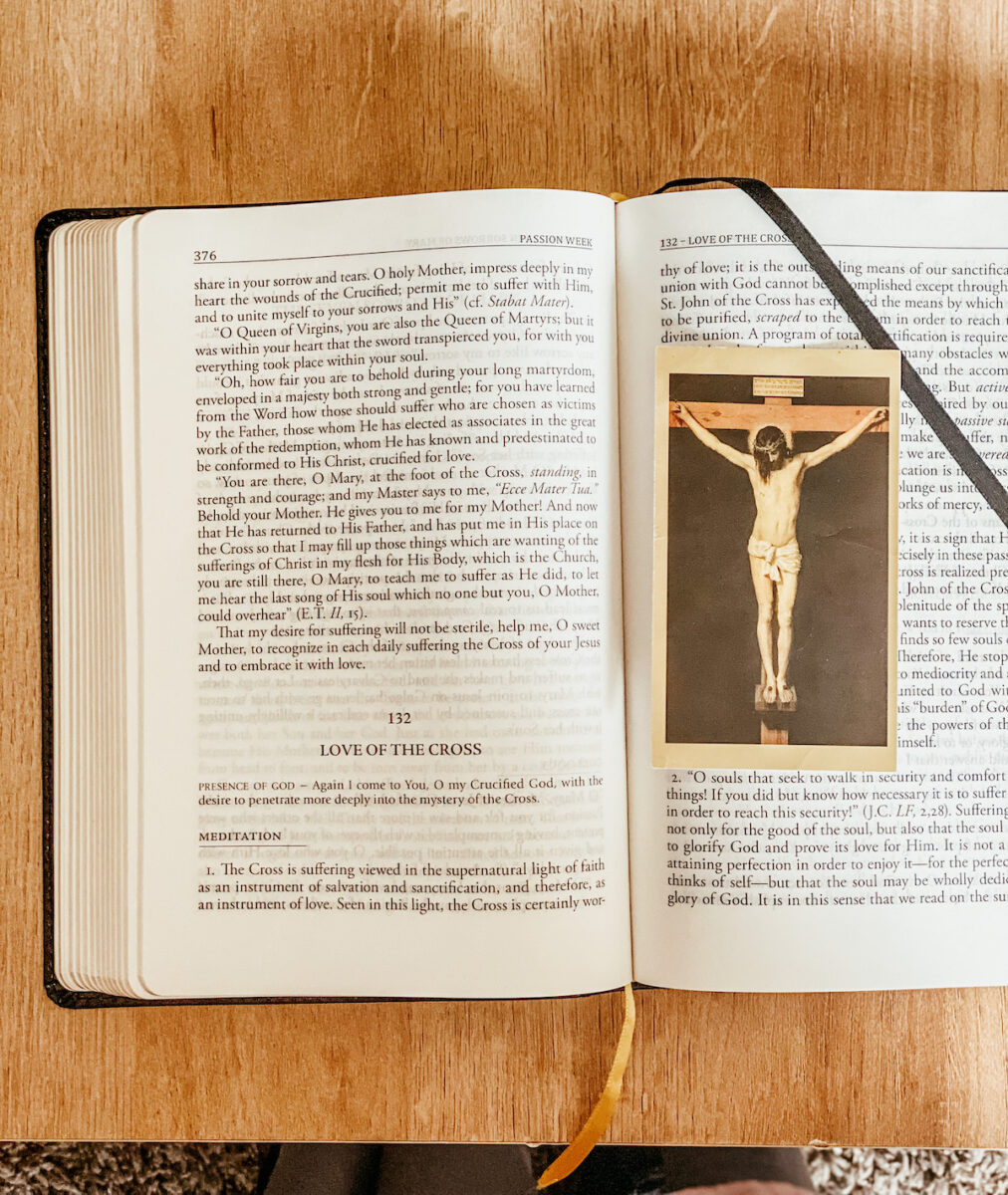
But let all things be done decently, and according to order.
1 cor. 14:40
Number one
Have a fixed hour for rising; from seven to eight hours’ sleep are usually sufficient. Beware of beginning your day by sacrificing to sloth hours every moment of which may avail you for eternity.
Let your first thought be of God; let it refer as much as possible to the subject of your meditation, and let it be accompanied with the resolution to combat the fault which is the subject of your particular examen.
“There is this difference between the general and particular examination,” says Father Hamon, ‘that the first embraces the whole of the sins which we have committed during the day, or the space of time to which the examination is limited, whilst the particular examen has for its aim a special subject, for example a vice, a virtue, an exercise, above all, the besetting sin, which is the weak side by which we are most exposed to lose our souls. This exercise is of great importance.”
It is indeed a very efficacious means of perfection. “The particular examen is a concentrated struggle of the will, not with all our faults equally but with one specially chosen as the most important to be overcome. It consists of two parts, the matter and the form. The matter is the fault selected for attack, or the virtue of which a habit is to be acquired; and the aid of a wise counselor is often necessary for its choice.
“The form is the practice of the exercise three times a day. Of these three times the first is at rising, when the resolution to watch and struggle against the fault is chosen should be renewed for the coming morning; the second is at noon, when the conscience is examined, and the number of times the fault has been committed is noted in a book; the due acts of self-humiliation, contrition, hope, and the renewal of our resolution for the rest of that day are made; the third is before retiring to rest, when the exercise is repeated as at noon.” – Flowers of Nazareth
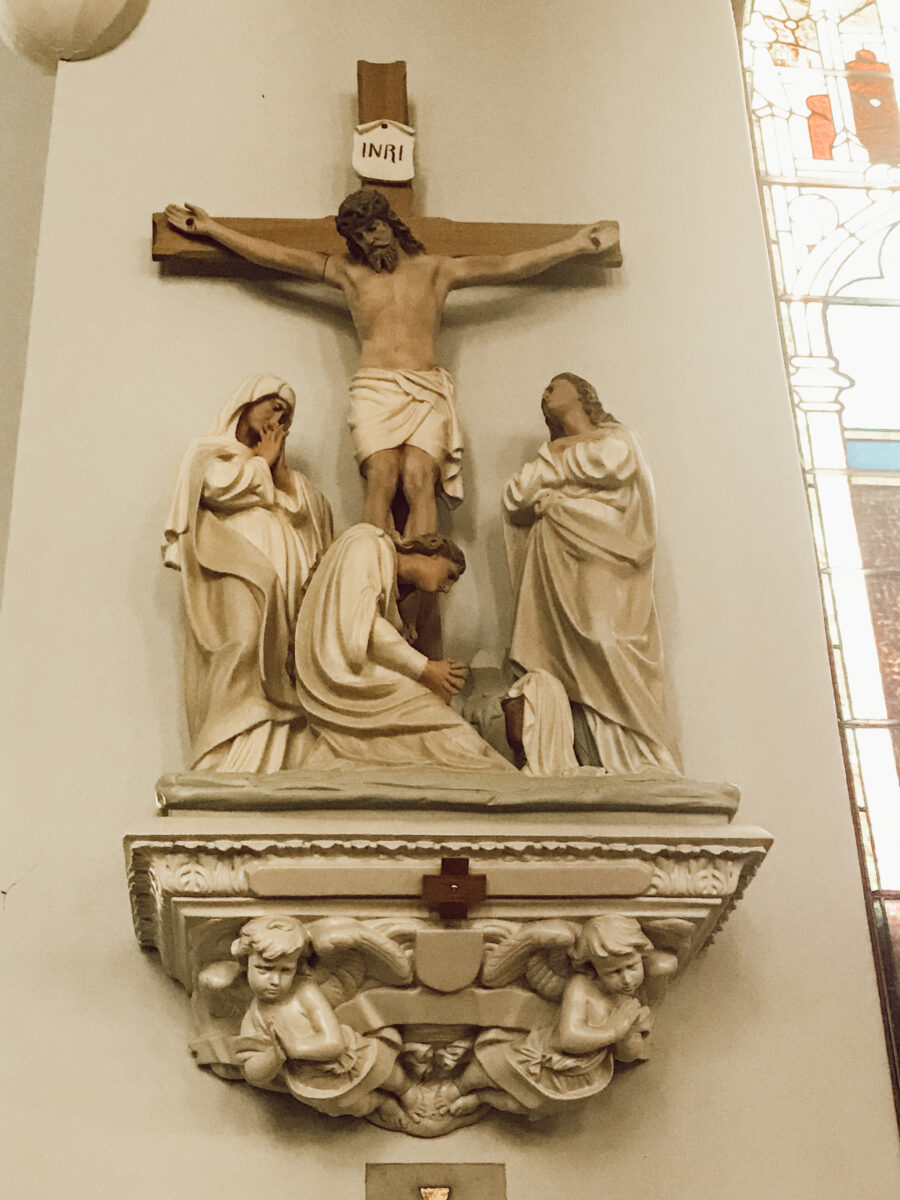
Number two
Give as much time as possible each day to prayer; determine this time according to your occupation, your attraction, and the advice of your director. Let your heart take much more part in this holy exercise than your mind; and let the mysteries of the life and passion of your Saviour be the usual subject.
Number three
Do not voluntarily deprive yourself, even for a day, of the inestimable happiness of assisting at the Holy Sacrifice of the Mass. Unite yourself to Our Lord by means of spiritual communion; offer yourself with Him to God His Father, and ask with perfect confidence, through the merits of His sacrifice, the graces of which you stand in need.
Do not fail to pray thus and to offer all your actions of the day in union with the merits of Jesus Christ, for the conversion of infidels, heretics, and sinners, for the progress of the just, and the triumph of our holy mother, the Church.
The morning offering of the “Apostleship of Prayer” is most commendable, viz.:
“O my God I offer Thee my prayers, works, and sufferings this day in union with the Sacred Heart of Jesus, for the intentions for which He pleads and offers Himself at Holy Mass, in thanksgiving for Thy favors, in reparation for our offenses and for the petitions of our Associates and all of the intentions recommended for this month.”

Number four
Give a certain time each day to the reading of a good book, according to the advice of your director. Read it in the presence of God, who speaks to you Himself. Reflect upon what you read; relish it; ask God to give you the grace to carry out the good desires with which He inspires you by means of this reading. Spiritual reading made in this way is a sort of easy meditation, and when we are deprived of a sermon may take its place.
Number five
Say your rosary every day, either alone or with others, and as you recite it accustom yourself to meditate affectionately on the mysteries of Our Saviour and His Holy Mother. This is the easiest and frequently the most fruitful of all mediations.
Number six
Make a daily visit, if possible to the Blessed Sacrament; go to Our Lord with the simplicity of a child; confide to His heart your joys, your sorrows, your temptations, and your faults. Make acts of adoration, thanksgiving, reparation, supplication, and spiritual communion.
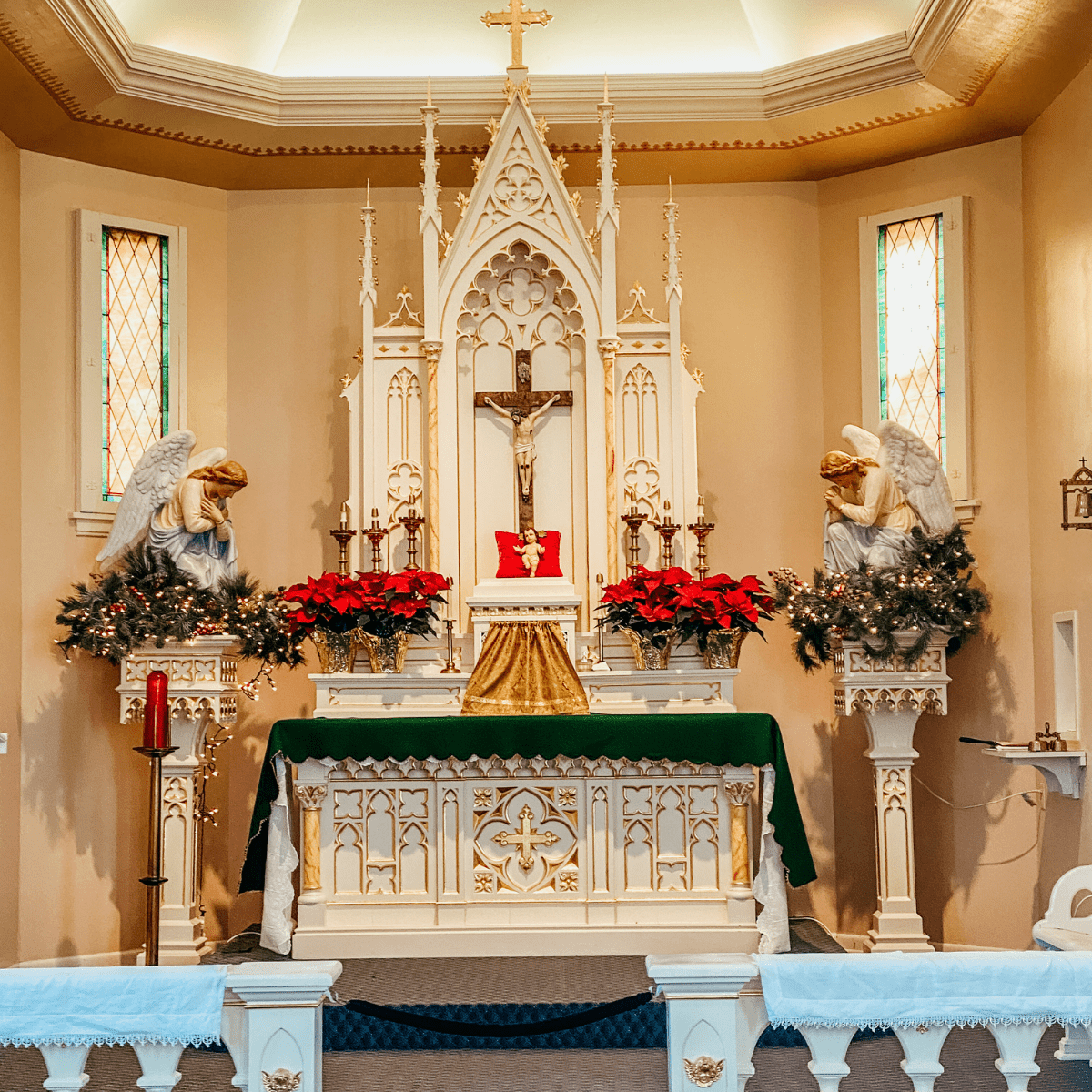
Number seven
The life of a Christian should be a continual exercise of penance. Mortify yourself in common and ordinary things; nothing is more necessary in order to establish in your soul the empire of grace and destroy that of nature.
Here are a few practices to this end:
- Resist your inclination to do something which is useless.
- Keep careful guard over your eyes.
- Refrain from raillery.
- Withhold a clever word likely to wound, or intended merely to satisfy self-love.
- Do not seek what merely flatters sensuality.
- Regulate innocent pleasures.
- Moderate that excessive tenderness we all have for ourselves.
- Detach your mind from pleasurable sentiments.
- Speak little and with moderation.
- Be courteous and kind to persons for whom you feel antipathy.
- Be silent under affliction and bear your cross with resignation.
Number eight
Devote yourself to your labor as well as to the fulfillment of all your duties energetically and with a pure intention to please God and make yourself useful to your neighbor. Do not forget that the most indifferent actions acquire, through a fervent intention, inappreciable merit for eternity.
Raise your heart to God from time to time by means of fervent ejaculations, that it may not be narrowed and absorbed by earthly occupations.
Number nine
Let no meal pass without offering a slight mortification to your Saviour, who accepted the bitter draught on the cross for love of you. These little sacrifices will avail you many graces, and will preserve you from the dangers of sensuality.
Number ten
Go to bed as far as possible at a fixed hour, and before doing so carefully make your particular examen as well as a general examination of the day. Let there be, if possible family prayer, that your petitions thus united may be more efficacious before God, and more advantageous to your children and to your servants.

Number eleven
Go to confession at least every fortnight; prepare yourself for it in the morning during your meditation and the Holy Sacrifice of the Mass. Give most care to exciting yourself to sincere contrition for your faults.
Number twelve
Receive communion as frequently as your director permits; bring to this great action all the devotion and care of which you are capable; approach the Holy Table with a contrite and humble heart, and an ardent desire to be united with Jesus. Pray that you may love Him more, that you may become more and more like to Him, and be ruled and guided by His spirit.
Number thirteen
In your relations with the members of your family and those about you, be kind and considerate; endeavor to make piety loved through you. Avoid with the greatest care that spirit of criticism, those little jealousies, petty weaknesses, and caprices which many vainly seek to reconcile with true piety.
Number fourteen
When you go out into the world avoid with equal care unseemly levity and repellent austerity, and while the politeness of the old school seems to be disappearing more and more, endeavor to revive in your social intercourse by that delicate courtesy, thoughtful consideration, and simple, modest bearing which are natural outcome of humility and Christian charity.
Number fifteen
Be inflexible in regard to dangerous books and questionable plays. Let even innocent pleasures be moderate.

Number sixteen
If God has placed you in a position to give yourself to good works, let them be your pleasantest recreation. Remember that in helping the poor and the afflicted you are helping Jesus Christ Himself; and that they, in thus affording you the means of meriting the gratitude of your God and the indulgence of your Judge, confer a greater benefit upon you than you can bestow upon them.
Regulate your expenses, moderate your attachment to the things of this world, and remember that you will be judged by a God who for love of you bore poverty, humility, and suffering. If your crucified Saviour wills to give you a small share of His sufferings, do not forget that the cross is the only incontestable mark of real love and the strongest bond by which your soul may be united with God.
This conviction will give you strength to overcome the repugnance of nature and to bless God in the midst of the most cruel trials.
Number seventeen
Select a day each month to prepare yourself for death, and on that day perform each duty as faithfully as if it were to be the last of your life. Go to confession and receive communion as viaticum.
Examine what might trouble you if this day were the last of your life: unjust possessions, unreconciled quarrels, etc. Repeat the acts made by the dying; acts of resignation, acts accepting the time, the place, the manner of the death God wishes you to die; acts of thanksgiving, of lively faith, hope, of confidence, of sincere sorrow, of love of God, etc.
Invoke Jesus crucified; implore the Blessed Virgin, St. Joseph, your angel guardian, your patron saint, to plead for you, that you may live a holy life and die a happy death.
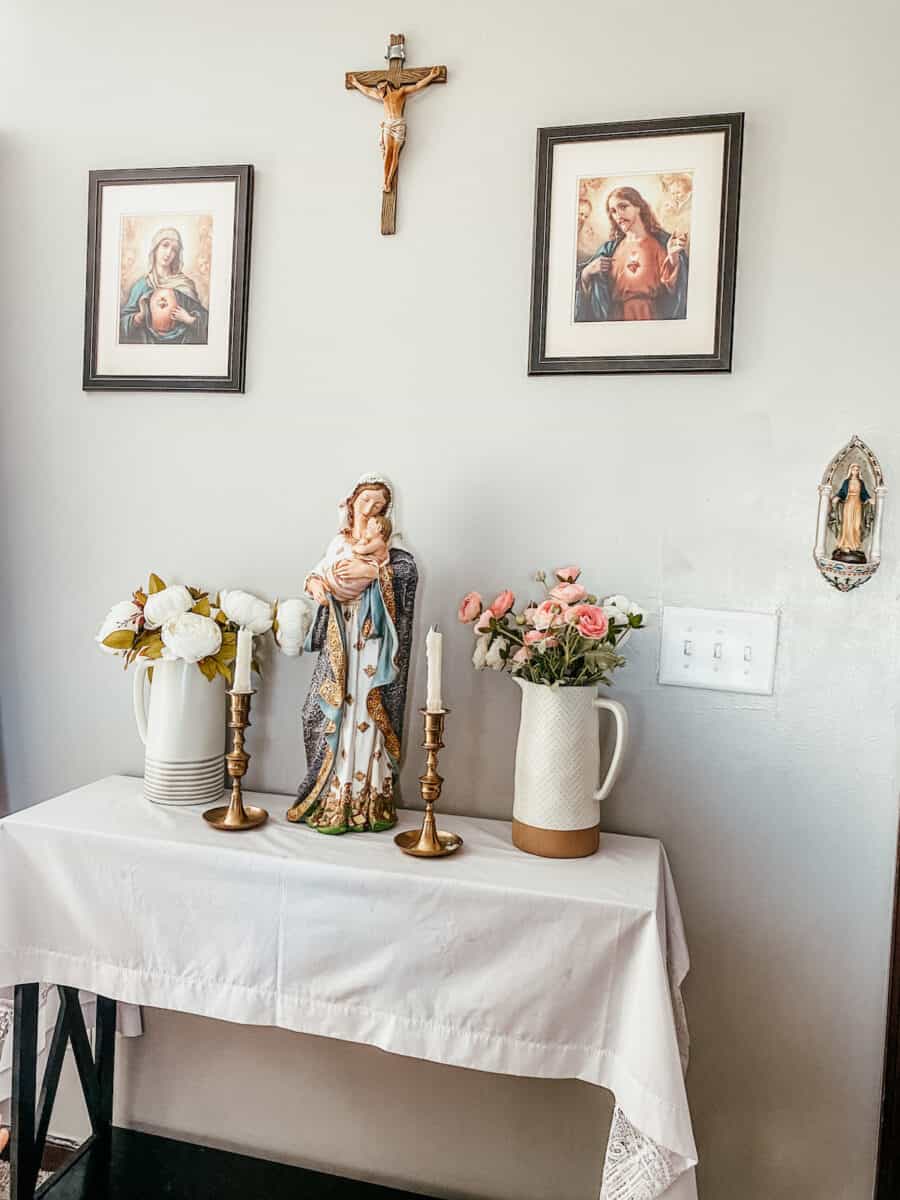
Number eighteen
Faithful devotion to the Sacred Heart of Jesus and His Blessed Mother is regarded as a certain means of salvation. Unite yourself with confraternities established in their honor. Practices enjoined by these associations are not onerous, do not oblige under pain of sin, and are enriched with numerous indulgences.
Nourish also in your soul sincere devotion to St. Joseph, the spouse of Our Lady, the the holy angels, and the saint whose name you received in Baptism.
Finally pray frequently for the dying and for the souls in purgatory.
Where would you like to start?







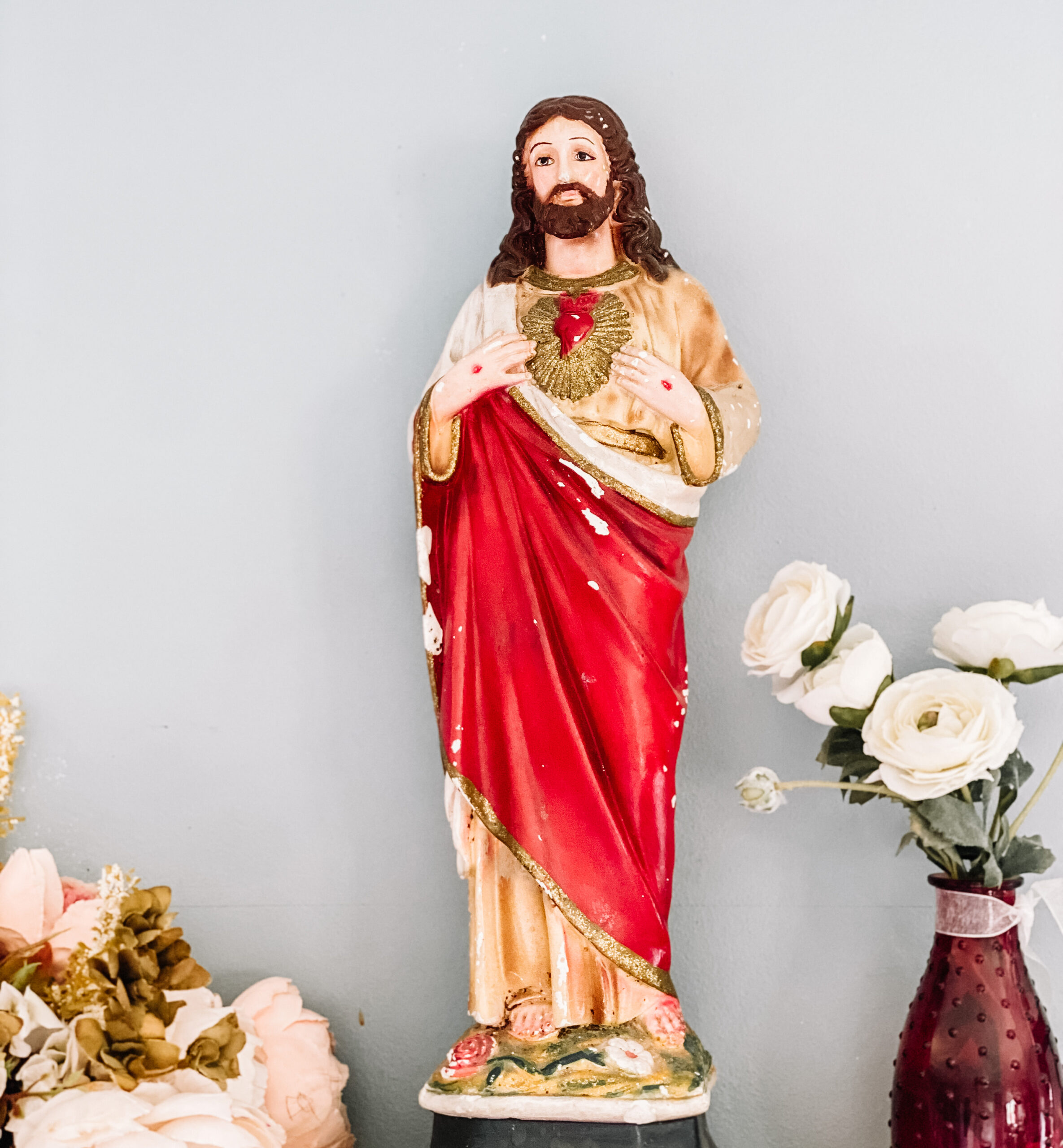



Can you please direct me to a link for your book in the photos? Thank you
We also live in Nebraska. Though we do not attend the TLM we appreciate the traditional prayers books and resources available. We also homeschool